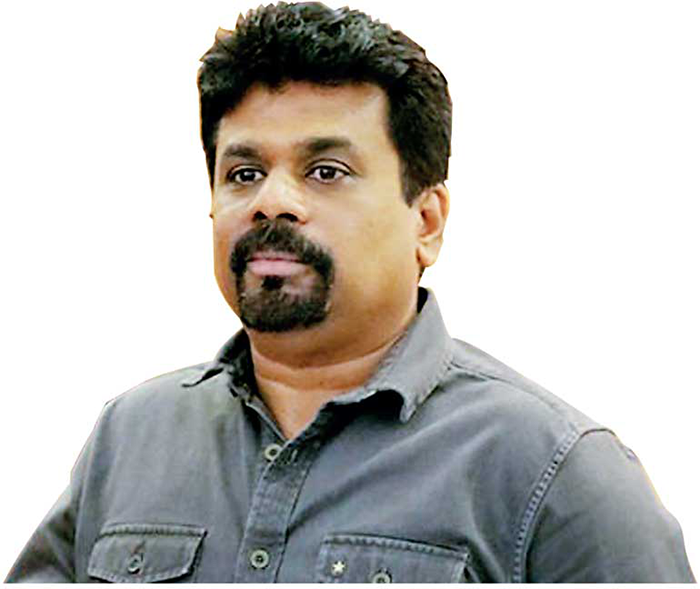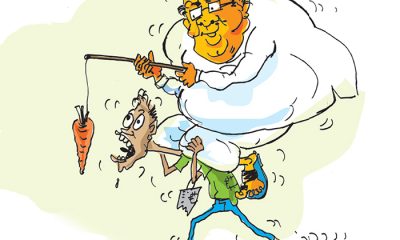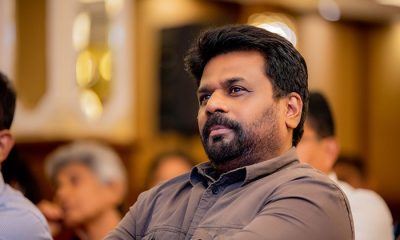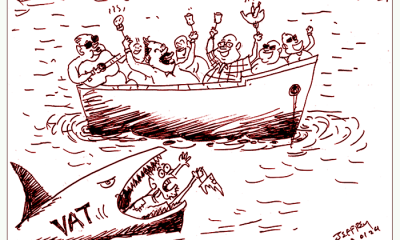News
JVP Leader questions wisdom of promoting privatisation

By Rathindra Kuruwita
Those who claimed that privatisation was the panacea for Sri Lanka’s economic ills had to present information about privatise institutions first, Janatha Vimukthi Peramuna (JVP) leader Anura Kumara Dissanayake said on Wednesday at a conference on privatisation of state assets.
Dissanayake said that the SLPP had campaigned in 2019 and 2020 on a platform of protecting and developing state assets. Therefore, if it embarked on a path of privatizing state assets, it should first go for an election and seek a new mandate.Dissanayake said that Sri Lanka had been privatising state assets since the 1980s and an overwhelming majority of those projects had led to disaster.
“In the 80s and 90s we privatised textile mills and paper manufacturing plants. Of course, there were issues with the quality of their products, but we have to understand that this was the 1980s. Now, these factories are closed, and we import almost all textiles now, burning a lot of foreign exchange. We also have a severe paper shortage and there are complaints that we don’t have paper to print school textbooks, exercise boots, term test papers and print newspapers. We privatised tea plantations, and these plantation owners claim that they can’t pay a daily wage of Rs. 1000. So, before telling us why we should privatise the rest of state-owned enterprises, the proponents of privatisation must show us the data on the impact of previous privatisation endeavours,” he said.
The JVP leader said that those who support privatisation often show Sri Lanka Telecom (SLT) as an example of the benefits of privatization. Dissanayake said that advocates of privatisation claim that before privatisation it took six to seven months to get a connection and that once the SLT was privatized everything changed.
“Is this what actually happened? If you look at the technological evolution of the telecommunications industry, the late 1980s and early 1990s saw boosts in digitization and wireless technologies. The privatization of SLT took place at a time when these technological developments were taking place.
“We benefited from technological developments in other parts of the world. The driver of efficiency in telecommunications in Sri Lanka was technological breakthroughs in the west, not privatization,” he said.
Dissanayake added that during the current economic crisis, those who represent powerful business interests have done a good job of convincing people that the best course of action is to privatize state assets.
“People are suffering and when they see the electricity bill or suffer from fuel hikes, they have been told that this is happening because the Ceylon Electricity Board (CEB) and Ceylon Petroleum Corporation (CPC) are owned by the state. They think the prices have gone up because there are too many workers in these institutions,” he said.
However, if the inefficiency of state owned enterprises is the reason for electricity and fuel price hikes, what could explain the dramatic rise in the prices of items like cement or biscuits or milk powder? the JVP leader asked.
“The government plays no role in producing cement. When it comes to milk powder, Highland only has about five percent market share and Highland is still cheaper than other brands. The advocates of privatization are silent on this. Or they tell us that milk powder is bad for the body, or we should not buy cement or biscuits. So, are we going to blame the inefficiency of the private sector for the price increase in biscuits? It is obvious that the current price hikes have little to do with the ownership,” he said.
Dissanayake said that the government is not proposing to only sell loss making institutions. Among institutions that are earmarked for privatization are profit making entities like the SLT, Sri Lanka Insurance Corporation and Sri Lankan ground handling and catering.
“Catering and ground handling departments of SriLankan make a lot of profit. I have looked at the annual reports of SriLankan catering from 2011 to 2021. They have been profitable in all years except 2020, they have been profitable even in the 2021-2022 financial year. It’s obvious why they made losses in 2020. If you look at ground handling, they are doing even better. They made a five billion rupee profit last year. The government is getting ready to sell them and I am sure there are many people ready to buy them. But what about the airline? No one will buy the airline because liabilities are higher than assets and this is a really bad time to run an airline. The government is ready to absorb all the losses of the airline, but even then there are no buyers. We will end up selling the profit-making entities and holding on to loss makers. This will only make things worse,” he said.
The JVP leader said that there are three main drivers that animate those who support privatization. Some of them are adherents of minimum government and believe that the government must not be involved in any businesses. On the other hand, the government is desperate for dollars.
“From 1980 we have failed to earn the dollars we need. In 2022, there is a gap of eight billion dollars to meet imports. If we had not defaulted we would have had to pay six billion dollars for debt servicing. How have we filled this gap? We used to make some money from tourism and foreign remittances. We filled the rest of the gap through borrowings and selling assets. Now we are scraping the bottom of the barrel,” he said.
Dissanayake added that another thing that animates privatization advocates is the opportunity to make money out of these transactions. He said that when large state institutions were privatized, those involved in the process made a lot of money.
“When Hingurana sugar was sold, the institution had 7000 acres of cane, a 300-acre plant nursery, a factory, and 70 million rupees in the bank and sugar in store. It was sold for less than sugar in the store. If we look at the current context, Minister Nimal Siripala is desperate to privatize SriLankan catering and ground handling because one of his deals went wrong a few months ago,” he said.
The JVP does not believe that the state should hold onto everything and try to involve itself in every sector, he said. However, the government has the responsibility to ensure that goods and services are available freely at a decent price, in good quality.
“We can control some aspects of the market through regulation. We can also intervene through the cooperative system. If you look at Amul, India’s dairy giant that makes billions of dollars in profit, is a cooperative. Fonterra, the producer of Anchor brand, is a cooperative. Imagine what we can do if we get small and medium scale rice millers into a cooperative and help them with finance and technology? We could easily break the monopoly of big mill owners and reduce the price of rice. Look at the tile sector, two businessmen run the sector, and now apparently people have to wait for months to get tiles. If we believed the advocates of privatization, this shouldn’t be the result of privatization. A JVP government won’t allow monopolies,” he said.
News
US sports envoys to Lanka to champion youth development

The U.S. Embassy in Colombo welcomed the U.S. Sports Envoys to Sri Lanka, former National Basketball Association (NBA) and Women’s National Basketball Association (WNBA) players Stephen Howard and Astou Ndiaye, from June 8 through 14.
The Public Diplomacy section of the U.S. Embassy said that it would launch a weeklong basketball program intended to harness the unifying power of sports, made possible through collaboration with Foundation of Goodness and IImpact Hoop Lab.
While in Sri Lanka, Howard and Ndiaye, both retired professional basketball players, will conduct a weeklong program, Hoops for Hope: Bridging Borders through Basketball. The Sports Envoys will lead basketball clinics and exhibition matches and engage in leadership sessions in Colombo and Southern Province for youth aged 14-18 from Northern, Uva, Eastern and Western Provinces, offering skills and leadership training both on and off the court. The U.S. Envoys will also share their expertise with the Sri Lanka Basketball Federation, national coaches, and players, furthering the development of basketball in the country. Beyond the clinics, they will collaborate with Sri Lankan schoolchildren to take part in a community service project in the Colombo area.
“We are so proud to welcome Stephen and Astou as our Sports Envoys to Sri Lanka, to build on the strong people-to-people connections between the United States and Sri Lanka,” said U.S. Ambassador Julie Chung. “The lessons that will be shared by our Sports Envoys – communication, teamwork, resilience, inclusion, and conflict resolution – are essential for leadership development, community building, equality, and peace. The U.S. Sports Envoy program is a testament to our belief that sports can be a powerful tool in promoting peace and unity.”
News
Rahuman questions sudden cancellation of leave of CEB employees

SJB Colombo District MP Mujibur Rahuman in parliament demanded to know from the government the reasons for CEB suspending the leave of all its employees until further notice from Thursday.
MP Rahuman said that the CEB has got an acting General Manager anew and the latter yesterday morning issued a circular suspending leave of all CEB employees with immediate effect until further notice.
“We demand that Minister Kanchana Wijesekera should explain this to the House. This circular was issued while this debate on the new Electricity Amendment Bill was pending. There are many who oppose this Bill. The Minister must tell parliament the reason for the urge to cancel the leave of CEB employees,” the MP said.However, Speaker Mahinda Yapa Abeywardena prevented Minister Wijesekera responding to the query and said that the matter raised by MP Rahuman was not relevant.
News
CIPM successfully concludes 8th Annual Symposium

The Chartered Institute of Personnel Management (CIPM) successfully concluded the 8th Annual CIPM Symposium, which took place on 31st May 2024. Themed “Nurturing the Human Element—Redefining HRM in a Rapidly Changing World,” the symposium underscored the pivotal role of human resource management (HRM) in today’s dynamic global landscape. Since its inception in 1959, CIPM has been dedicated to advancing the HR profession through education, professional development, and advocacy, solidifying its position as Sri Lanka’s leading professional body for HRM.
Ken Vijayakumar, the President of the CIPM, graced the occasion as the chief guest. The symposium commenced with the welcome address by the Chairperson, Prof. Arosha Adikaram, followed by the Web Launch of the Symposium Proceedings and Abstract Book by the CIPM President. The event featured distinguished addresses, including a speech by Chief Guest Ken Vijayakumar, President of CIPM, and an address by Guest of Honor Shakthi Ranatunga, Chief Operating Officer of MAS Holdings Pvt. Ltd., Sri Lanka.
The symposium also featured an inspiring keynote address by Prof. Mario Fernando, Professor of Management and Director of the Centre for Cross Cultural Management (CCCM) at the University of Wollongong, Australia.
Vote of Thanks of the inauguration session was delivered by Dr. Dillanjani Weeratunga, Symposium Co-chair.
The symposium served as a comprehensive platform for researchers to present their findings across a wide range of critical topics in HRM. These included Cultural Diversity and Inclusion, Talent Development and Retention, Ethical Leadership and Corporate Social Responsibility, Adapting to Technological Advancements, Mental Health and Well-being at Work, Global Workforce Challenges, Employee Empowerment, and Reskilling and Upskilling.
The plenary session was led by Prof. Wasantha Rajapakse. Certificates were awarded to the best paper presenters during the valedictory session, followed by a vote of thanks delivered by Kamani Perera, Manager of Research and Development.
The annual symposium of CIPM was a truly inclusive event, attracting a diverse audience that spanned undergraduates, graduates, working professionals, research scholars and lecturers. This widespread interest highlights the symposium’s significance in the field of HRM, offering a unique opportunity for everyone to network and learn from scholarly brains.The CIPM International Research Symposium was sponsored by Hambantota International Port, Sri Lanka Institute of Information Technology (SLIIT), E B Creasy & Co. PLC, and Print Xcel Company.
























